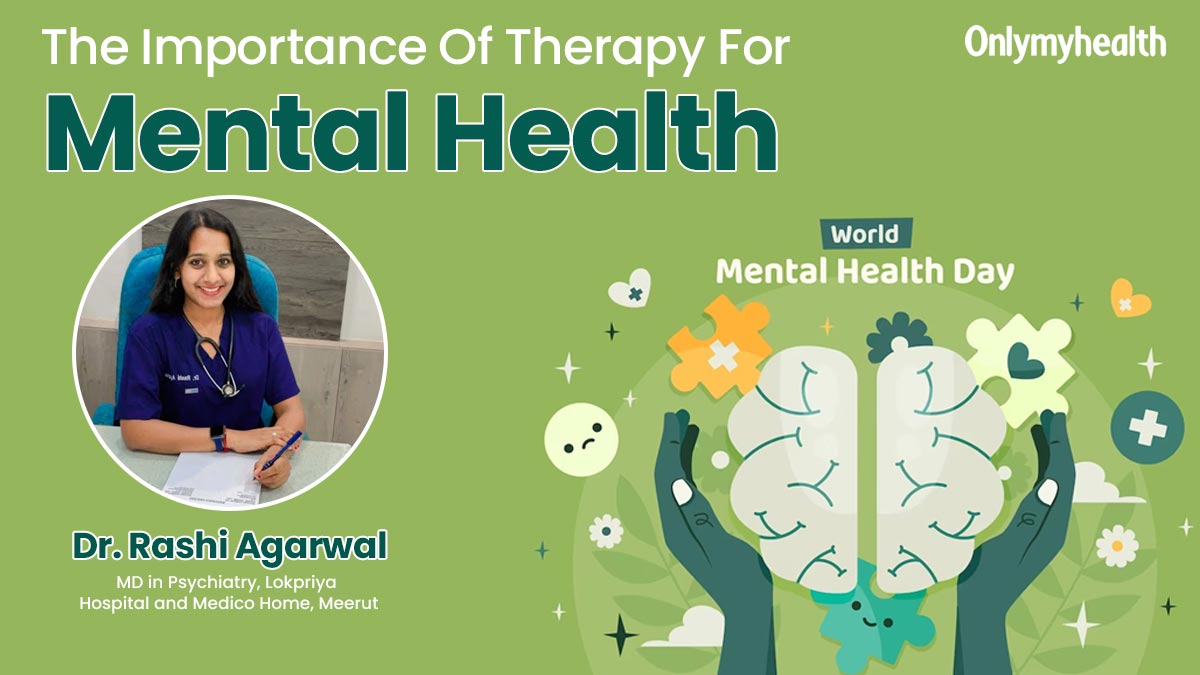
As much importance as we give to our physical health, many of us fail to give that same amount of effort and support to our mental health. It is unfortunate that we still struggle to recognise the urgency to make supportive changes for our emotional and psychological well-being.
Table of Content:-
According to the World Health Organization (WHO) report, 1 in every 8 people, or 97 crore people around the world had a mental disorder in 2019. Approximately, 28 crore people have depression worldwide, with women being more prone to it than men. More than 7 lakh people die of suicide every year, making it the fourth leading cause of death in 15–29-year-olds. What's more concerning is that even though effective treatments are available, more than 75% of people in low- and middle-income countries receive no treatment, as per the WHO. Call it lack of awareness or education, blame it on stigmas and discrimination, there are many aspects to why people don't seek help.
On World Mental Health Day 2023, we at OnlyMyHealth spoke to Dr Rashi Agarwal, MD-Psychiatry, Lokpriya Hospital and Medico Home, Meerut, to understand the role of therapy in managing mental health issues and why people should seek help irrespective of what the society says.
Also Read: World Suicide Prevention Day 2023: Strategies To Overcome Hopelessness - A Risk Factor Of Suicide
Role Of Therapy

Therapy, also referred to as psychotherapy, talk therapy, or counselling, is a type of treatment that helps people with mental health conditions resolve their mental or emotional issues. It involves meeting and talking with a trained professional, who in turn helps a person identify and change difficult emotions. This includes coping with stressful life events, the impact of trauma, medical illness or loss such as the death of a loved one, and specific mental health conditions, such as depression or anxiety, according to the American Psychiatric Association (APA).
Why Is It Necessary To Normalise Therapy
Normalising therapy is in itself a major challenge. Due to the existing stigmas around mental health issues, therapy is often viewed in a negative light. Moreover, public stigma around mental illness and seeking professional help has a significant impact on people who suffer from problems that could be treated. Self-stigma, which the British Psychology Society (BCS) describes as an internal form of stigma, restricts people from seeking help. This can be attributed to "senses of shame, low self-efficacy, and lack of confidence", which make patients try to avoid stigma by not seeking the required treatment, says a study published in the International Journal of Mental Health Systems.
According to Dr Agarwal, stigma is one of the biggest issues that prevents people from seeking help at the right time, making them sit on those issues and leading to more aggressive management later on in life.
“Psychotherapy, talk or talking therapy, counselling, or simply therapy- no matter what the name it is known by - mental health counselling can benefit people struggling with emotional difficulties, life challenges, and mental health concerns,” she stresses.
Therapy And Suicide Prevention
.jpg)
Discussing the role of therapy in mitigating the risk of suicide, Dr Agarwal says, “The detection of suicidal intent, assessment of risk, and the possible prevention of suicide can be explored well in an established therapeutic relationship.”
“The concept of risk mitigation rather than risk management should be the cornerstone of any community suicide prevention strategy. A lot of work is needed to be done for the ways in which suicide risk is understood, assessed, and responded to in all sectors,” she adds.
A study, published in the Journal Frontiers, found that Dialectical Behavioral Therapy (DBT) and Cognitive Behavioral Therapy (CBT) were the most used psychotherapeutic treatments in patients with a diagnosis of borderline personality disorder (32.5%) and depression (15.0%). The study suggested that these interventions led to a reduction in suicidal outcomes - suicidal ideation by 55% and suicide attempts 37.5%.
Signs You Should Seek Therapy
.jpg)
According to the National Institute of Mental Health (NIMH), people seek therapy for many reasons. These include:
- Struggles with severe or long-term stress from a job or family situation
- Experiencing symptoms with no physical explanation, such as changes in sleep or appetite, low energy level, lack of interest or pleasure in activities you once enjoyed, persistent irritability, excessive worry, or a sense of hopelessness that won’t go away
- A health care provider suspecting you have or diagnosing you with a mental disorder that is interfering with your life
- Supporting a family member or child who has been diagnosed with a condition affecting their mental health
In addition, overthinking and regretting old decisions, feeling hopeless and helpless along with interpersonal issues, lack of concentration, and relationship problems can also signal a need for therapy, says Dr Rashi.
“Even if there are no active issues present in hand, therapy can still help clearing your mind to come to better decision making, knowing yourself, your likes and dislikes, and can promote overall healing,” she concludes.
Also watch this video
How we keep this article up to date:
We work with experts and keep a close eye on the latest in health and wellness. Whenever there is a new research or helpful information, we update our articles with accurate and useful advice.
Current Version